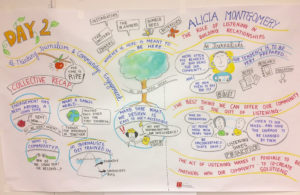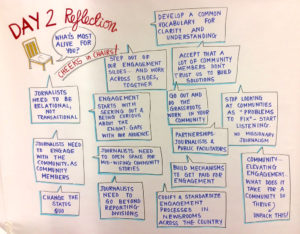
 END OF DAY REFLECTIONS
END OF DAY REFLECTIONS
CONTEMPORANEOUS NOTES
How do we elevate engagemement for communities to thrive?
An end of day exercise. People speak a comment on that question and folks in the circle either sit down or stay standing.
Journalists need to be relationship not transactional with the communities they serve.
Journalists need to approach journalism as members of communities
What would it mean if we stepped outside our different engagement silos as organizers, facilitators, artists, journalist and whatever else and actually engaged aross those silos to make a bigger difference?
Engagemement can start by seeking out the curiosities of your audiences and the information gaps they have and starting your reporting there.
Journalsits need to open space for midwifing the communities’ stories.
Journalists should go beyond highlighting the divisions.
Accept that a lot of people don’t trust us enough to engage with us.
By fostering partnerships between those of us engaged in public engagement work as facilitiators with journalists, that will move us forward in a juicy way.
We need to figure out how to work together because we have to, in a way that sustains everyone involved in that partnership
To elevate engagement we have to figure out how to get people to pay for engagement and create the mechanisms for that.
Codify and standardize this kind of process in newsrooms across the country every month.
Reporters have to get out and cover the damn grass roots movements in the communities – I apologize for cursing.
We need to stop looking at faith communities as problems or as problems we need to fix and stop practicing missionary journalism and do what we think the communities are interested in in.
Change the status quo.
Some project missions seem similar so to elevate engagement some of us have to work together and merge projects.
It’s important to develop a common vocabulary for developing clarity and understanding.
NEXT, general reflections at the end of Day 2
It is great to start a aconversation, go into that conversation, listen and learn from you without having any fear. Jerome.
I wanted to thank all the nonjournalists who I’ve met here and who have spoken up. We do a good job of talking to each other — but not listening. Thanks. Alicia Montgomery.
Thank Monsoor for the session on voices of kids with mental-health issues not being captured and how to get them to write, even for themselves. Saboobin.
Mike Fancher: It’s occurring to me that a lot of this I have been involved in this for awhile. It is far more important than I ever knew, when I think about the state of our country and our democracy, we have to succeed, we have to find this path and stay on it.
King Clemnschower – One of the most refreshing things of being here — Every is working toward the same goal but approaching it from different angles. Everyone here is trying to figure out the same thing I am; any conversation, something useful will come of it. All of the disagreement has been respectful and confortable. There is no fear about voicing dissent, even if you are in the minority someone is going to talk to you about it.
Peggy Holman: Picking up on these last two themes. Regarding Mike’s comment about urgency: A scholar has sayd that cultures die within a generation when they cease to have a positive vision about their own future. Think of the role of journalists as storytellers – it’s chilling. Jervis Bush said where generative images emerge – something like sustainable development – someone coined the term, it generated incredible creativitiy. Generative images, where they emerge help us to imagine a future. Journalists have a role to play in that. Add too the observation — are being kind to each other? The form of discourse that’s the norm in our culture is debate – the Latin meaning is to beat down – and it is what we have been culturally doing with each other. What we are doing here is being seeded by another form of discourse called dialogue – “meaning flowing through” – curiosity and inquiry and making connections and discovering differences are a source of innovation and creativity. I would never have been able to do that on our own. We need those conversations. Imagine a journalism that is guided by dialogue, that comes from a dialogic point of view.
My open space sessions were essentially one on one. One was: “Can I practice listening to you?” It was just Michelle and me. But that was quality time of becoming vulnerable to someone in the room. And I went from Michelle on to Mike Fancher. Something about today — when you kept speaking about running into people at the right time. Let the time happen and flow, I just kept that in mind all day. I won’t run from a conversation. For my session I thought no one was coming. When Mike showed up, he said he was looking for the session called by the person who called themself a recent college grad. We took our session outside and walked along the water. Today has been awesome.
Jason Preston: I’m not a journalist and just showed up, but adding things to the pool that can be thought about over the remainder of this event. I do help create and support a community of people who want to put a dent in the universe. We do that through shared experiences and getting people together in person. The experiences I’m are related – they are the building blocks of community engagement and empowerment. Think about how those building blocks can be brought into the journalism that you do and the people around you.
Taylen: Many people I’ve met today work for nonprofit newsrooms, few work for for-profit newsrooms like me. What is the future of journalism and engagement when we’re money and profit focused? How can journalism sustain itself when even if you are a non-profit you have to listen to people who are paying your bills and writing your paycheck?
David, from a nonprofit online magazine that writes about issues important to the people of Michigan. We are trying to expand our audience and have people more involved about the issues important to people in our state. What I’d like to see before I go, is more concrete ideas, something I can take back to other folks that are the kinds of things that work, that you can quantify. There has been lots of interesting talk and smart people, but also a lot of stuff that sounds like academic nonsense – I don’t mean to be negative but I don’t know what some of this stuff means. I want something that we can use, even with your NGOs, they want to see growth, the foundations, and more time on page. To talk about things that make us feel good but also expand our message.
I want to second what David just started. Not to be answered right now. I dare ask the question: If the gathering were to end now, sleep on this question: What can you take from this day and a half that you can employ tomorrow in your business or profession? See if it fits to a newsroom, and business, your big family.
I’m thinking about the difference between being beaten up and beaten down. A point Peggy has made. It seems like both are going on. Where is engagement headed? The other thing: I’m not a touchy feely person — don’t let my sweater deceive you. I recognize some of what the person previously said about academic language that maybe doesn’t feel quite as tangible as it should be. But I also don’t think we are engaging in touchy feely and that makes me glad I’m here. I’d like to put my time and energy into things that are more concrete and maybe trickle in over time.
Mike Green: I want to say thanks to that. I was in her session and it was very impactful because we did talk about the emotional aspect, the fluffy, the thing that when people read what you write and consume what you produce they don’t consume it in a vacume, they bring their prejudices. People understood that. We had three minutes to solve the world’s problems. In that three minutes something I didn’t know about myself I discovered. What would you do if you had to adopt your own child? And there were all these various ramifications depending on your lifestyle you lead. In a group of three there were two of us who actually had to adopt our own child. We decided to make a game, pick your life, navigate through the issues; imagine writing an op-ed about your decisions, find a couple and walk them through that process of adopting your own child. It is a multimedia package we produced inside of four minutes.
I learned I could collect three business cards, two of which are going to my alt weekly and one is going to a major funder to see if we can replicate it in our state. I also referred someone here to a big nonprofit institution in our community. It would be interesting to find out how many business cards were swapped and who was swapping them.
I’m Tom, age 57, and I’ve been doing journalism since I was 15. Kids this is the shittiest time we have every been in. We have government and journalism kicking each other. Those who want to still do this work, God bless them!
Michelle Ferrier: We’re talking about elevating engagement for communities to thrive. There are some communities we don’t have trust in. One Tweet is a woman from Ferguson who’s brother had been killed the day before. She said I’m going to tell you about it before the word gets out. How do we arive at a point of engagement when communities are afraid to engage? We haven’t shown our ability to listen or connect. The work we have to do as journalists will take time to do, especially in underserved and underrepresented communities.
Ann Stadler: OTIS — The elevator principle. OTIS – only the important stuff. I want to recommend the OTIS principle that we are acting upon.

Pingback: Table of Contents | Elevate Engagement Session Notes